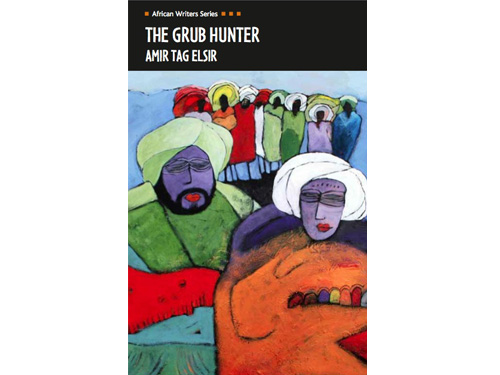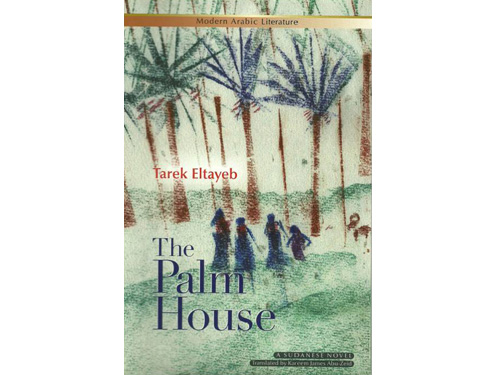
It was not Amir Tag Elsir’s plan to write a novel within a novel. When he first sat down to pen “The Grub Hunter,” shortlisted for the 2011 International Prize for Arabic Fiction, it was because Elsir had been struck by an image.
“I suddenly remembered an accident that happened when I was working in the Port Sudan hospital, in the surgery department,” said Elsir, who is also a practicing physician, in an email interview. “They brought three victims from a security car that had been watching a road leading to a farm — they were exactly as I describe in the book.”
One of the three accident victims was alchemized from Elsir’s memory into his protagonist: Abdallah Harfash, also known as Farfar. After his leg is blown off by “friendly fire,” Farfar is forcibly retired from his position with Sudanese security services.
Farfar makes an unlikely narrator for a book about writing. When “The Grub Hunter” opens, he has not yet read a single novel. Before the accident, Farfar’s sole contact with books was in seizing the “subversive” ones from stores.
But he does have plenty of experience watching others and writing reports about them. So an idea worms its way into Farfar’s consciousness: He must write a novel!
“The Grub Hunter” is a short book, just 133 pages, and follows Farfar from the moment this idea begins to obsess him to the project’s rapid end.
Metafictions often give an author time and space to ponder the nature of writing, as indeed this book does. But most of the characters in “The Grub Hunter,” like Farfar, are not high-minded literary types. Instead, they are struggling Sudanese citizens.
And the greatest charm of the novel is when these minor characters are described in visceral detail.
For instance, there is the cheese-eating tailor who used to snap to attention when Farfar came by his shop. After Farfar’s forced retirement, neighborhood merchants no longer give him the same treatment, as when, “lethargically, [the tailor] ran a measuring tape around my chest, waist, hips and back, recording his readings on a dirty piece of paper, which had been balled up on the ground in front of him, and which he had picked up and smoothed out.”
These earthy characters are paired with others who can raise questions about creative writing in a police state. When Farfar decides he wants to write a novel, he attaches himself to the novelist A.S. who functions as Farfar’s mirror opposite.
Farfar has watched and imprisoned others; A.S. has been watched and imprisoned. Farfar writes down exactly what he hears; A.S. writes what comes from his imagination.
A number of other characters veer between organic and symbolic dimensions. Farfar’s closest relative is his aunt “Th.” Her husband, Mudallik, is so keen on becoming an actor that he enlarges his tiny roles in two plays with attention-grabbing stunts.
The first puts him in hospital, and the second is a long, unscripted soliloquy in favor of the regime, “Long live our faithful leaders! Down with communism! Down with imperialism! Down with America!” It is delivered at the end of a leftist play and ruins the creative work. But it also catapults Mudallik to TV stardom.
The book has a number of these symbol-heavy moments. But its pace is so fast, and its humorous sparks so frequent, that the symbols hardly slow down the action.
The book has issues it wants us to consider, such as: What does it take to produce a novel? Who, under what conditions, can think creatively? But the narrative merely touches on these questions and moves swiftly on. Elsir even inserts two chapters of a fictional novel, “Eva Died in My Bed,” without slowing the pace.
“Eva Died in My Bed,” a novel by the fictional A.S., takes place in Soviet Russia and highlights another sort of surveillance: men watching women. All these types of surveillance — men of women, police of novelists, novelists of people — have interesting echoes.
But it is the characters’ small failings, like Farfar’s hapless rigidity, that makes the novel enjoyable. Farfar appreciates A.S.’s book, “Eva Died in My Bed,” but he doesn’t understand it. And when he first attempts to write his own novel, he ends up reproducing an old surveillance report word-for-word.
Dozens of minor characters embroider the book with their small charms. One of the novelists in A.S.’s circle, a woman named S., should be an unbearable stereotype: She is a young woman who has written a bad novel about love, publishable only because of her youth and relative beauty.
But while she initially seems like an unjust stand-in for all struggling female novelists, the small details from her readings humanize her — even as her situation remains comic.
As might be expected, security forces notice Farfar’s new pastime and the new company he keeps. Farfar is wholly surprised at their attentions. He agrees that they must keep tabs on writers, but finds their warnings amusing, as he has not yet produced any novel or anything else “that could be studied for subversive tendencies.”
Still, the security forces are concerned. Farfar thus finds himself at a crossroads: Can he remain a novelist or must he go back into the service and spy on his friends? At the end, there is a switch, a sleight-of-hand, and control of the novel shifts.
The translation, by William Hutchins, is somewhat flat-footed, with an overly pedantic tone. But the novel is nonetheless memorable and enjoyable, less for its big ideas than for its wealth of small, flawed characters, all of them watching for something.
This piece was originally published in Egypt Independent's weekly print edition.

